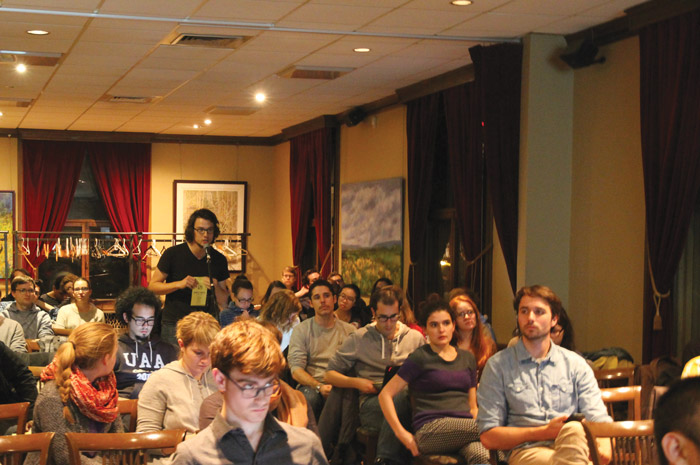Non-tuition compulsory fee reform
Graduate students will be consulted this Winter on a reform of the non-tuition compulsory student fees approbation mechanism. Non-tuition compulsory fees, or Frais Institutionnel Obligatoires (FIO), are associated with mandatory university services. They are paid by all students to apply, enroll in, or attend university. Currently, they are also collected by student societies recognized by the administration under a Memorandum of Agreement (MoA).
Under the current system, students are consulted upon the introduction of fees categorized as faculty, program, and course-related, explained PGSS External Affairs Officer Julien Ouellet.
“We [currently] have the power to veto the university when they want to implement such fees,” Ouellet said. “The current decision-making process, however, [is] very quick [and] raises concerns of legitimacy and transparency [….] I need more information to make decisions on your behalf.”
Currently, all decisions regarding the FIOs are made by the Fee Advisory Committee (FAC). This committee is composed of members of the academic staff, SSMU, PGSS, McGill Association of Continuing Education Students (MACES) and the Macdonald Campus Student Society (MCSS). Each member holds veto power over FIOs that concern its members. The proposed reform would allow the PGSS External Affairs Officer to consult with students rather than make decisions on his own.
The reform proposes to have all compulsory course-related fees approved through a vote by the executive team of the affected Post-Graduate Student Association (PGSA). All faculty-wide fees would then be approved by a PGSA referendum.
“We would submit a ready-made motion to the PGSA president and financial affairs officer that would contain the FIO’s amount, the course to which it would be applied, and the name of the affected PGSA,” Ouellet explained. “The [PGSA] president would then be required to hold a vote at their next PGSA committee meeting. A simple majority of all committee members in attendance would be required to pass the motion.”
The consultations will examine the possibility of keeping the Fee Advisory Committee (FAC), which is currently the authority that decides which fees will affect PGSS, as well as retaining the PGSS representative to act as a liaison between PGSAs and McGill. They will also consider eliminating the position of the PGSS representative and granting those responsibilities to the executive committee as a whole.
The PGSS will hold consultations during Winter 2015 to obtain feedback from students in order to make the fee reform process transparent.
2014-2015 FEUQ action plan
The President of the Fédération étudiante universitaire du Québec (FEUQ), Jonathan Bouchard, presented the organization’s action plan for the coming year at the council meeting, expressing that the focal point of the FEUQ’s campaign is to bring the provincial loan and bursaries program up to date.
“The cost of living has evolved by 44 per cent over the last 20 years,” Bouchard said. “Allowable expenses, [however,] have only increased by 23 per cent. There is a huge discrepancy between the reality and what is actually covered by the program. Our goal is to update the need assessment.”
Bouchard continued to explain that FEUQ’s actions for the coming year will revolve around two axes.
“We need to participate in the different commissions, meet the different members of the National Assembly and form a broader coalition around this action plan,” he said. “The newly elected government has a very strict economic action plan to eliminate deficit—that involves mobilization on campus and participation of students in different local and national forums.”
The presentation was followed by a question period. In response to student questions regarding the current anti-austerity demonstrations, Bouchard explained that the FEUQ would be protesting austerity measures.
“[The] FEUQ is a part of the organization that has launched the campaign for the demonstration on the 29th of November,” Bouchard said. “The organization involves many groups from civil society and unions […. It’s] an informal collective organizing a demonstration.”
PGSS Council passed a motion supporting the Nov. 29 demonstration and encouraging its members to participate.








